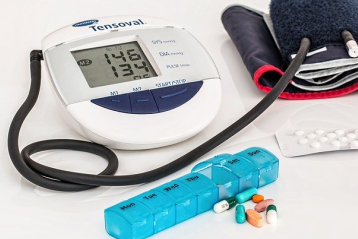Two blood pressure medication types can reduce colon cancer risk.*
“Today, close to 15 percent of men between 45 and 65 are contingent works. Their paycheck stops when they take time off,”
Jesse Slome, director of the American Association of Critical Illness Insurance
Blood pressure colon cancer risk, July 7, 2020: Colon cancer is the third most common cancer and the second leading cause of cancer death in the United States. It is expected to cause about 53,200 deaths during 2020. Overall, the lifetime risk of developing colorectal cancer is: about 1 in 23 (4.4%) for men and 1 in 25 (4.1%) for women.
A new study reported suggests that two types of blood pressure drugs might do double-duty. They can benefit those with high blood pressure. In addition they can keep colon cancer away.
The report specified that angiotensin converting enzyme inhibitors (often called ACE inhibitors) and angiotensin II receptor blockers (ARBs) help lower blood pressure. The medications are prescribed for conditions such as heart failure, high blood pressure or heart disease. They relax and open up narrowed blood vessels, allowing blood to flow freely.
A 22 percent lower risk of developing colon cancer
Researchers at the University of Hong Kong analyzed the health records of more than 185,000 adult patients. The study examined patients from 2005 to 2013. Compared to nonusers of the drugs, those who took ACE inhibitors or ARBs had a 22% lower risk of developing colon cancer in the three years following a colonoscopy that declared them cancer-free. The study excluded individuals who had a prior history of colon cancer.
The benefit was especially true for patients who were age 55 or older. In addition, those with a history of colon polyps showed beneficial results. The results were published July 6 in the journal Hypertension. They showed that the drugs do not reduce the risk of all colon cancer, but are particularly beneficial in preventing colon cancer that arrives soon after a colonoscopy.
The study also found that the longer you use the medications, the more likely you are to experience a benefit. For every year that the patients took the drugs, the risk of developing colon cancer in the three years following a clear colonoscopy was lowered by 5%.
Blood pressure cancer risk impacts men, planning is essential prior in 40s and 50s
“One medication to treat two demons is great. But men still need to plan because both health issues are real and come with consequences,” says Jesse Slome, director of the American Association for Critical Illness Insurance. “After age 40 men start to get cancer in greater numbers. And heart disease really starts to become a problem after age 50, 60 or 70.”
“Better medications offer hope and the reality is that most men diagnosed with colon cancer will survive,” Slome notes. “But two things they are not prepared for include the cost of health care not covered by their health insurance and taking time off from work. Today, close to 15 percent of men between 45 and 65 are contingent works. Their paycheck stops when they take time off. A modest cancer insurance policy can cover those uncovered costs and replace lost income while one undergoes treatment and recovery time.”

* Source. Science Daily, July 6, 2020 and American Heart Association report
Find costs for cancer insurance using the free Cost Calculator.
How much does cancer insurance cost? Get an instant example by using the Association’s Cancer Insurance Cost Calculator. Click a few buttons and see an instant cost for $10,000 of benefits. If you are offered employer critical illness insurance coverage at work, see what to compare.

